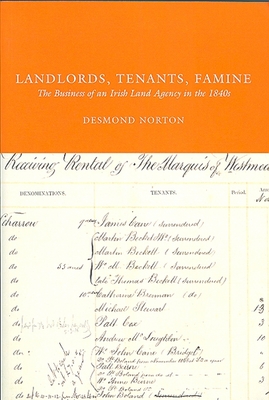Landlords, Tenants, Famine
Michael O'Sullivan reviews Landlords, Tenants, Famine: the business of an Irish agency in the 1840s by Desmond Norton, UCD Press, ISBN 1-904558-55-0, £18.95/25 euro

THERE'S MATERIAL here for half a dozen books. Desmond Norris has put together a huge panorama of events from 1840's Ireland, based on the previously uncatalogued correspondence archives of the Dublin-based firm of Messrs. Stewart and Kincaid, land agents to a number of substantial landlords throughout the infamous famine decade.
The author estimates that he discovered and examined some 30,000 pieces of correspondence in the course of his research. The book is packed with information, though none the less readable for that.
The social and economic climate of the time and consequent changes in land management meant the demise of the old 'middlemen', and the use instead of specialist agents to handle matters of all types arising between landlords and their tenants.
Stewart and Kincaid's business therefore included not only rent collecting but making valuations, organising improvements, lending money to both parties, and of course supervising evictions when necessary.
Norton's investigative scheme is impressive, and large-scale; his method is to select individual estates managed by the firm by way of background, and to analyse the prevailing conditions there in the light of the existing correspondence.
Though it must be said that Norris is conscious throughout of the hazards of drawing general conclusions from individual examples.
The huge estates in Sligo of the future prime minister Lord Palmerston for example, 'progressive landlord' or avaricious rackrenter, depending on viewpoint, were managed in part by Stewart and Kincaid and provide a case in point.
He built houses, roads, schools, even churches for his tenants, and did improve the whole area enormously, though it is not of course difficult to determine his true motivation.
What we have here is an invaluable account of the relationships existing at the time between landlords and their tenants. Norton describes types of land holdings, rent collecting, marriage arrangements and even family squabbles. We get a real feel for the politics of the period, the workings of the postal system, public and private travel, and, naturally, issues like land agitation and emigration.
The effects of the famine are dealt with thoughtfully; the acute distress and the tardiness of the relief efforts make grim reading. Palmerston's solution was to clear large parts of his estates and ship as many tenants as possible to America, though that is probably another story.
This book is sure to encourage further similar work, which is another reason to be grateful to Desmond Norton for his great efforts.
Connolly Association, c/o RMT, Unity House, 39 Chalton Street, London, NW1 1JD
Copyright © 2007 Michael O'Sullivan

